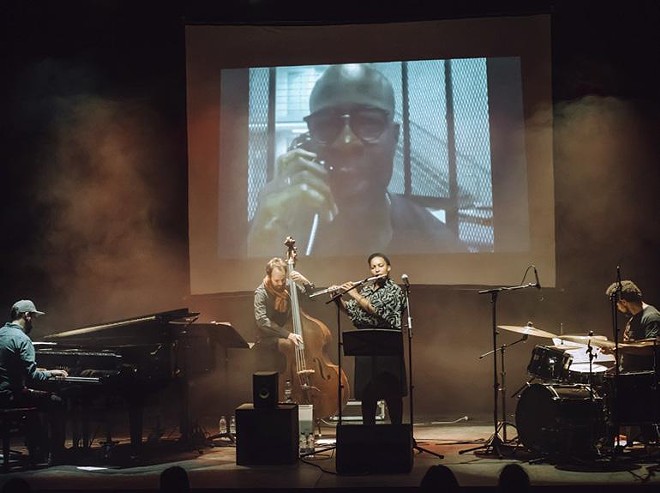
LaMar, a 53-year-old poet-artist born in Cleveland, has spent the majority of the past 34 years in solitary confinement at the Ohio State Penitentiary, waiting to be killed by the state for his role in helping to instigate the 1993 Lucasville Prison uprising — a crime he swears he did not commit.
On July 13th, Ohio Governor Mike DeWine granted LaMar reprieve, pushing his scheduled execution date back three-and-a-half years as the state's unofficial moratorium on executions continues due to "ongoing problems involving the willingness of pharmaceutical suppliers to provide drugs to the Ohio Department of Rehabilitation and Correction."
LaMar has staked a claim to fame since 2020, when he started performing a series of free-form, spoken word poems from a phone several feet away from his cell, a collection he's now dubbed "Freedom First." A trio or quartet of musicians, those he's never met and may never meet in person, perform compositions usually of their own creation, songs that match LaMar's oceanic breadth of hope and despair.
On November 8th, at the Cleveland Museum of Art, LaMar will call in live to perform with a quartet spearheaded by Barcelona-born pianist Albert Marquès. Both headliners seem to be steeped in the tradition of protest jazz, to use the term, which brings to mind historical pieces with orchestral stabs at social injustice: John Coltrane's "Alabama" and Nina Simone's "Mississippi Goddam," for example. It's this world, along with LaMar's own ineffable one, that formed the backbone of Marquès' compositions.
"The idea was to amplify Keith's voice. To use music as a vehicle for people to listen to his case and help him," Marquès told Scene in an email. "Nobody can explain better than Keith what racism and the prison industrial complex is, he has been digested by it."
The following interview with LaMar, conducted over email and phone, was edited for length and clarity.
SCENE: Your upcoming concert will be done live, with you calling in from the penitentiary phone. What's it feel like to have an audience listen to you from a place they don’t understand?
LAMAR: It's always such a surreal feeling to be here and to be in another place at the same time. I've done enough shows by now to be able to hold some of the details in mind as things are unfolding, and so I keep my eyes closed during the performances, which allows me to kind of teleport myself to another dimension, another space and time; and for a few glorious hours I escape the rigors of my confinement.
I also know from experience that the audience is equally transported to a place that exists outside of the parameters of their everyday lives, which, as their minds confront the contradictions of what they've been taught to expect (from someone in my situation), introduces them to a different kind of freedom: spiritual freedom.
SCENE: Tell me about growing up in Cleveland. And what was music’s role in your life as a kid and teenager?
LAMAR: It was the happiest time of my life, although I didn't know it at the time.
The Village had its own maladies and dysfunction, ranging from domestic abuse, alcoholism, drugs—all the things that attend living in a small-town setting. There were more places of refuge there, places where a young person could hide, but only to the extent that it meant escaping from reality, which I did quite often.
I was walking home from my grandparents' one day, and found a treasure trove of albums in an abandoned (read: stolen) vehicle. That began my true love affair with the medium. I can't imagine my life without music. I'm sitting here listening to The Spinners as I write this, one of the groups I discovered when I was a little boy walking home from my grandparents’.
SCENE. You’ve had artists spend countless hours writing, recording, filming and performing pretty much all in your name, and for your innocence—from those in Spain to New York to Oregon. What do you think these artists see in you? What do you think of them?
LAMAR: They see that I'm genuinely into the music. I'm not a musician, but I am an adherent, someone who recognizes and identifies with the healing and transformative powers inherent in the art form. As I said, my whole life is centered around music, and I think when it comes to musicians, we share a kind of kindred spirit and affinity.
SCENE: What is it about jazz, specifically the '60s and '70s experimental, free-form music, that conveys a sense of freedom for you?
LAMAR: What drew me to "jazz" is the freedom involved in its delivery. It's truly the only art form that is predicated on living (playing) instinctually, from the core of who you are, and having what comes stand as the pure representation of who you are, what you've been through, what you've endured and conquered.
So, it’s a living music, something that simultaneously teaches you—if you learn how to listen—how to decipher and transcend the complexities of life.
SCENE: In “No Man’s Land,” you write, “Whole days float by in pieces / My job: / to assemble the moments / make them mean something.” Also, in “Drowned and the Saved,” you describe being in solitary as floating in water “far as the eye can see.” I see this as another metaphor for jazz. Where does this come from?
LAMAR: I'm trying to explain the effort of assembling the disparate pieces of reality and, like an artist, how to put them together to form a sense of meaning. Very often life is too big to absorb fully, through the senses, and so breaking it down into manageable portions provides us with the opportunity to actually do something.
It's the enormity of life that traps and hinders us, that leaves us feeling overwhelmed, and sometimes it just takes a mental repositioning to see only what one is meant to do in the moment.
SCENE: Prosecutors Bill Anderson and Seth Tieger have noted that your sentence and guilt has been held up in appeals every time. What are they getting wrong?
LAMAR: Most every capital case that has been eventually overturned has had to run the full gamut of the legal process. That my case has now wound its way through the legal labyrinth is not unique.
At the end of the day, when all is said and done, this is a business, a very lucrative one, and it's set up so that everyone involved gets a piece of the pie (so to speak). Once they're done picking over the carcass of a case, that "corpus," then and only then is there the potential for "justice," which is very often delayed (or denied) on purpose.
Bill Anderson and Seth Tieger know they deprived me of a fair trial, but they also know that there's no law that will hold them accountable for the attempted murder of my life. What does is matter if I get out after thirty years of torture and hell? The miraculous thing is that I still know how to spell my name, which is to say, my brain has survived the assault on my being. This system is a sham!
SCENE: Your execution was originally planned for November 16th, and, due to the state’s reprieve, is now rescheduled to January 13, 2027. What should your supporters be doing in those three years?
LAMAR: We have to keep telling the story, keep fighting the power, if for no other reason than to document our assault on deceit. People focus too much on the dying part of the equation, but death is a given. It's the living portion of life that deserves our time and attention. We'll all be gone soon enough, and what will matter then is how hard we tried to live, how earnest were our collective efforts.
It may be the case that I find myself on a gurney after all. Well, okay. But it won't be because I laid down and died. They're going to have to kill me, actually do the thing they allege I did, and then we'll see who "the real killers" are. Until then, I intend to keep living, consequences be damned!
SCENE: You’re out. You’re free. What are you doing that first day?
LAMAR: When I make it to the other side of this insanity, I will spend that first day of freedom with those I love, those who loved me through the thick and thin of my journey. My day will be spent thanking all the people who made it possible.
'Freedom First' will be performed Nov. 6. at 7 p.m. at CMA's Gartner Auditorium. Tickets for non-members are $22 and can be purchased here.
Subscribe to Cleveland Scene newsletters.
Follow us: Apple News | Google News | NewsBreak | Reddit | Instagram | Facebook | Twitter | Or sign up for our RSS Feed













